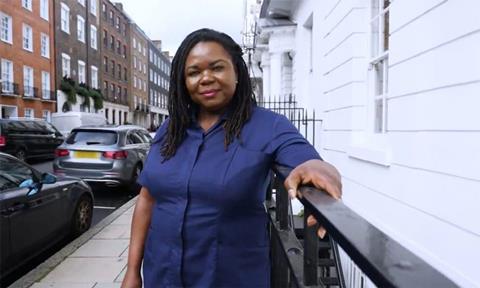After refusing to use female pronouns to address a male paedophile who racially abused and threatened her on duty, Christian nurse Jennifer Melle was suspended by the NHS and made to face months of investigation and uncertainty. Having finally been cleared and reinstated this week, she shares her story in full

I came to the UK from Uganda when I was a teenager. From a very young age I enjoyed caring for people - that’s why I became a nurse.
Training, juggling long shifts and coursework while raising my daughter alone hasn’t been easy, but my faith in Jesus has carried me through. He is my strength when I feel weak, my peace when the world feels chaotic.
Nursing, for me, is more than a job, it’s a calling. I love caring for people, listening to their stories, and helping them heal. I’ve held the hands of the dying, comforted the grieving, and celebrated recoveries.
Every patient matters, and for 12 years I worked without issue on the front lines of the NHS at St Helier Hospital in south London.
In May 2024, everything changed for me.
Conviction and conflict
A new patient was brought onto the ward. I’ll call him Mr X. We were briefed that he was a sex offender, transferred from a secure unit for medical treatment. He was brought onto a male ward, his records said he was male, but the name written above his bed was a very feminine name.
He entered the hospital chained to two guards and was clearly masculine in appearance, standing over six feet tall and of large build.
Mr X is male. He has committed horrific crimes against children. To call him “she” not only felt wrong, but like a betrayal, not just of reality, but of the victims who suffered at his hands.
As Christians, it is a clear and foundational belief that we are born male and female in the image of God. To say or do otherwise would be a lie, and a sin.
During the night shift, a junior colleague approached me in distress reporting that Mr X was wanting to discharge himself and was shouting and alarming other vulnerable patients on the ward.
I said: “I am sorry I cannot refer to you as her or she, as it’s against my faith and Christian values but I can call you by your name.”
I decided to support my colleague and take charge of the situation. We needed to get hold of the duty doctor to get advice and guidance on the discharge. Finally getting hold of the doctor, I said, “Mr X would like to discharge…”
Overhearing the call, enraged Mr X screamed: “Do not call me Mr! I am a woman!”
Still on the phone to the doctor, I called back to Mr X that I was speaking to the doctor and was working out what medication could be given to him before he was discharged.
Finishing the call, I approached the patient’s room. Stepping inside, I found Mr X pacing up and down in chains. I politely said: “I am sorry I cannot refer to you as her or she, as it’s against my faith and Christian values but I can call you by your name.”
I then began to relay what the doctor had said, but the abuse and vitriol escalated: “Imagine if I called you n*****,” Mr X yelled. “How about I call you n*****? Yes, black n*****!”
I said if he carried on, I would have to call security.
Mr X then lunged threateningly towards me and pursued me out of the room until he was eventually held back by the guards.
He then shouted: “I want your name and NHS number and am going to report you to the police for homophobia and to the Patient Advice and Liaison Service” (PALS). Returning, I said, using Mr X’s feminine name: “I got you your pain relief.” After having the painkillers, Mr X calmed down and was quiet until the morning.
Afraid and upset by what had happened, but keeping it inside, I handed over to colleagues on the next shift but felt unable to speak to anyone about what had happened.
The fallout
The next time I was on night shift, I was pulled aside by a ward manager and asked to make a statement about what had happened.
After I said that I was still feeling impacted by the racial abuse and threat of physical attacks, I was told that despite that I still had to respect “equality and diversity” according to the Nursing and Midwifery Council (NMC) code of conduct.
Since then, I have been investigated, disciplined and was reported to the NMC as a potential ‘risk’ to the NHS and the public for not using a paedophile’s preferred gender identity.
The racism and threats I experienced didn’t matter.
After being issued a final written warning, with the help of the Christian Legal Centre, I filed a legal claim on the grounds of harassment and direct discrimination.
I may not have shown it, but I was deeply alarmed by what had happened to me. I could not believe that the NHS was prepared to put the ‘feelings’ of a paedophile above the deeply held beliefs of a Christian nurse, trying to do her job.
I told my story to the media, and it made front-page news.
For whistleblowing, however, the Trust suspended me on full pay. I have been suspended for the last ten months and have lived under a cloud of uncertainty. Would I lose my job? Would I be struck off the register? Would I be able to provide for my children?
Justice in Jesus
Through it all, I’ve held onto Jesus. He was falsely accused. He stood for truth. He suffered injustice. And he walks with me now.
I am deeply relieved and grateful to hear that Epsom and St Helier Hospital has confirmed it will take no further action against me. This has been an incredibly long and painful journey, and I want to give thanks, first and foremost, to Jesus, who has sustained me every step of the way.
The recent legal victory for the Darlington nurses has shown that sanity and common sense are finally beginning to return to the NHS. It marks a turning point. No more nurses should ever have to endure what the Darlington nurses went through, what Sandie Peggie went through, or what I have gone through. None of us should be punished for speaking the truth, for standing by our professional judgement, or for living according to our deeply held beliefs.
I am thankful that this chapter is closing, but I remain determined that the lessons of my case, and the cases before mine, must be learned. The NHS must protect its staff, uphold fairness, and ensure that no nurse is ever again placed in an impossible position for simply doing their job with integrity.
We call on the health secretary Wes Streeting to immediately implement lawful policy in line with the Supreme Court ruling that upholds biological reality that men are men and women are women.
I don’t think there has been a legal case like mine before, but it isn’t just about me. It’s about the kind of society we’re becoming. Are we really going to punish nurses for refusing to lie? Are we going to silence Christians who speak truth, even indirectly?
I believe in dignity for all. But dignity must be rooted in truth.



































No comments yet